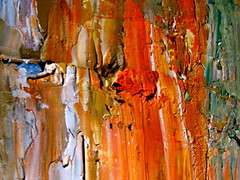
Tuesday evening I attended an unforgettable performance of Berg's opera WOZZECK at the Met. It was a brilliant production, with incredible singers and amazing set designs. The orchestra, one of the world's best, played the difficult score with phenomenal detail and color. I was so inspired watching James Levine--the conductor--eliciting such powerful playing with such subtle gestures.WOZZECK is a very intense opera, a truly tragic and haunting story, and this production was as good as one could possibly hope for. If you live in or around NYC, Friday night is the last performance.
I attended with an old acquaintance, an artist who now lives in California. He calls himself a "conceptual artist." This is a term that makes me bristle. I am a conceptual artist. Every artist I know is a conceptual artist. I don't know one serious artist who is not investigating and searching some kind of conceptual world. I find the term so pretentious that I found myself barely stifling snide comments while we caught up. In fact, at one point I could not resist and said something so acid and double-edged that I would not be surprised if he never speaks to me again (there were other reasons for my bad humor toward this guy, but I will not divulge the details). But I stand by my belief. Any artist who creates is creating work that expresses a concept, a belief system. What "conceptual artists" do is find it necessary to provide a manifesto to explain their otherwise inscrutable work. In my humble opinion, good art does not require an explanation, but rather an open-minded viewer. Explanation from the artist, to me, denigrates the artwork.
The unfortunate fact is that these "conceptual artists" populate the faculties of universities all over, teaching "conceptual art" to young aspiring artists, many of whom could not produce a painting or sculpture of any refinement. Without technique, without craft, art is meaningless.

1 comment:
Although I don't have the same level of experience with music or visual art, I've had similar experiences as a writer. I've known other writers in workshop settings who get very put out if the rest of the group doesn't understand something in their work. They launch into these long-winded explanations of what they were trying to express, but don't seem to grasp that if we didn't get it from the words on the page, then the writing failed, no matter what their intention. The writing has to speak for itself to do its job, because the author isn't going to be standing there in everyone's living room explaining what they read as they read it. (Although sometimes I think the Oprah-ish "reading guides" at the ends of books attempt to do that.)
Post a Comment